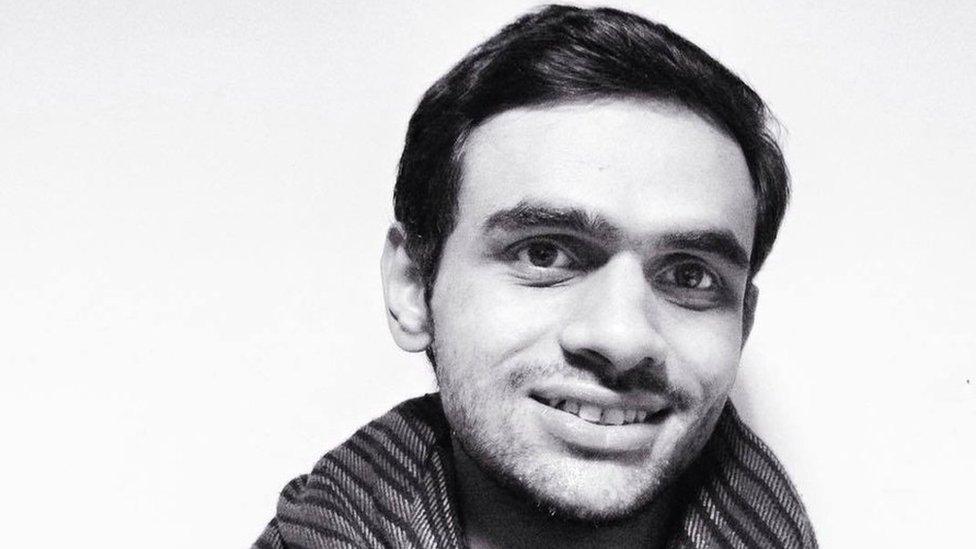Kanhaiya Kumar: India's most loved and loathed student
- Published
Kanhaiya Kumar talks about his politics
Revolution still remains some distance away at Delhi's prestigious Jawaharlal Nehru University, external, but the Indian spring has already arrived in the wooded campus with a vengeance.
A bank of bougainvillea is in full bloom, the air is crisp and pleasant, and parrots squawk noisily in a clear, blue sky.
On a rocky outcrop ringed by the flaming red and orange vines and red-brick living quarters for teachers, Kanhaiya Kumar, India's most loved and loathed student, looks remarkably composed.
He is the president of the students' union, is affiliated to the Communist Party of India, and considers himself a Marxist.
It's been barely a month since the 28-year-old PhD student of African studies was picked up by the police and charged with sedition for allegedly shouting anti-India slogans at a meeting on the campus. (Two other students remain in custody.)
The meeting had been organised against the 2013 execution of a Kashmiri separatist convicted over the 2001 Indian parliament attack.
Mr Kumar's views have been divisive in India with some calling him "anti-nationalist".
It's barely a week since he was freed on bail, and gave an impassioned speech , externalon the campus that went viral.
Some however have expressed discomfort with his political energies, with one JNU professor saying that his speeches could be inflammatory.
Mr Kumar, according to political scientist Suhas Palshikar, is the latest student to be associated with the "simmering unrest" on Indian campuses, a "result of the BJP's newfound ideological aggression and political arrogance". Many others are calling him a student icon.
'Met his match'
Over the last month, Mr Kumar has inspired a hefty Wikipedia entry, external, paeans to a rising leader (Red Star over India, exulted The Telegraph, external), even listicles, external. His friends reckon he has already given 50 media interviews in five days.
A little-known fringe group leader with a paltry bank balance announced a bounty , externalon his head, his Facebook account has been hacked, his mobile phone seized by the police. Some people have even begun raising money in his name.
Mr Kumar's many admirers believe Prime Minister Narendra Modi has "met his match", external in the feisty student.
But like the prime minister, the student leader is, at once, a controversial and polarising figure.
Makarand Paranjape, a JNU professor of English, says he is uncomfortable with some of Mr Kumar's inflammatory rhetoric and the arrogance in his speeches.
"This is a strange kind of polemic where there is no acknowledgment of what the system is giving, there is no appreciation, only endless abuse," Prof Paranjape told Firstpost, external.
His critics have called him an anarchist, a misguided idealist, external, a sloganeering "Johnny-come-lately who is upstaging stalwarts", external, and given him gratuitous advice on how he should stop politicking and begin earning for his poor parents. A former woman student has raised objections, external to his conduct in public.
"I get up in the morning, do some work for the union, and then do interviews all day. They say after TV channels and newspapers, the magazines will come," he says.
Mr Kumar appears to be basking in the warm glow of his meteoric media rise. When he's not handling the scrum, there's time for some light banter with friends. When a friend teases him about being an attention seeker, he quips, "Only (Prime Minister Modi) suffers from an attention seeker's syndrome." Some hearty laughter follows.
He's carrying some handwritten papers of Brecht's poetry, translated in Hindi - "The book is out of print, so we are sharing these handwritten poems."
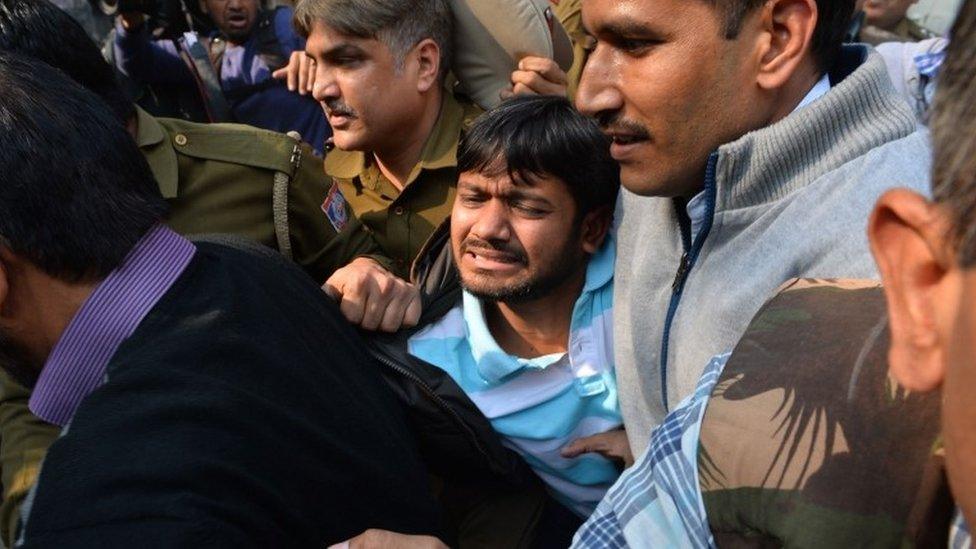
Kanhaiya Kumar was charged with sedition for allegedly shouting anti-India slogans at a meeting on the campus
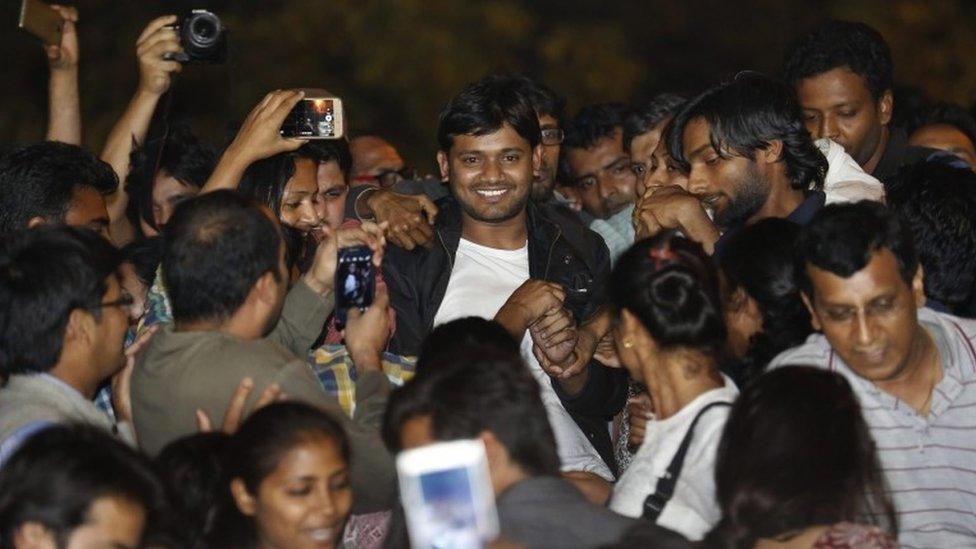
Mr Kumar is now the university's most famous student
Many believe that in a nation desperate for heroes and soaked in a febrile media culture adept at myth making and instant vilification, Mr Kumar has been thrust into an uncomfortable spotlight by a fumbling and offensive government and a clutch of hostile news channels. So does he feel like an accidental hero?
"I am no hero," says Mr Kumar. "Thank the people who made me a hero, including a section of the media who work for a particular party. The real heroes and heroines are those who are fighting for democracy against an authoritarian regime."
He does not suffer from any false modesty. He hasn't become famous overnight, he says. It has been a "gradual process" since he first arrived at JNU from his village in Begusarai in Bihar. (His father, a small farmer, cannot work any longer as he is paralysed after a stroke and his mother is a government childcare centre worker.)
'Culture shock'
"I had a culture shock when I arrived in JNU. There are students from 145 countries here. My horizons have grown. Last year, I was voted as the leader of the students' union," he says.
Students say his rousing performance in November's presidential debate, external - a town-hall discussion, a day before the union election - made him a name on the campus. A Kumar speech, delivered in fluent Hindi, is usually an animated performance of oratory, rhetoric, wit and gladiatorial mojo.
"The number of Facebook friends jumped from 2,000 to 5,000. A thousand people followed me. There is now pressure from people when you are not updating your status. Four hundred people like your status now, up from 20 before," he says.
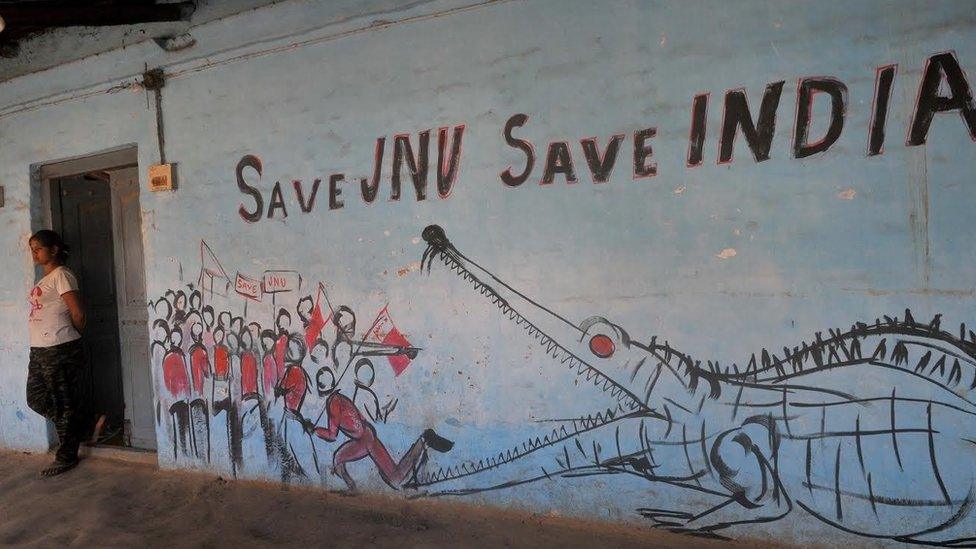
Mr Kumar's house in Begusarai district of Bihar
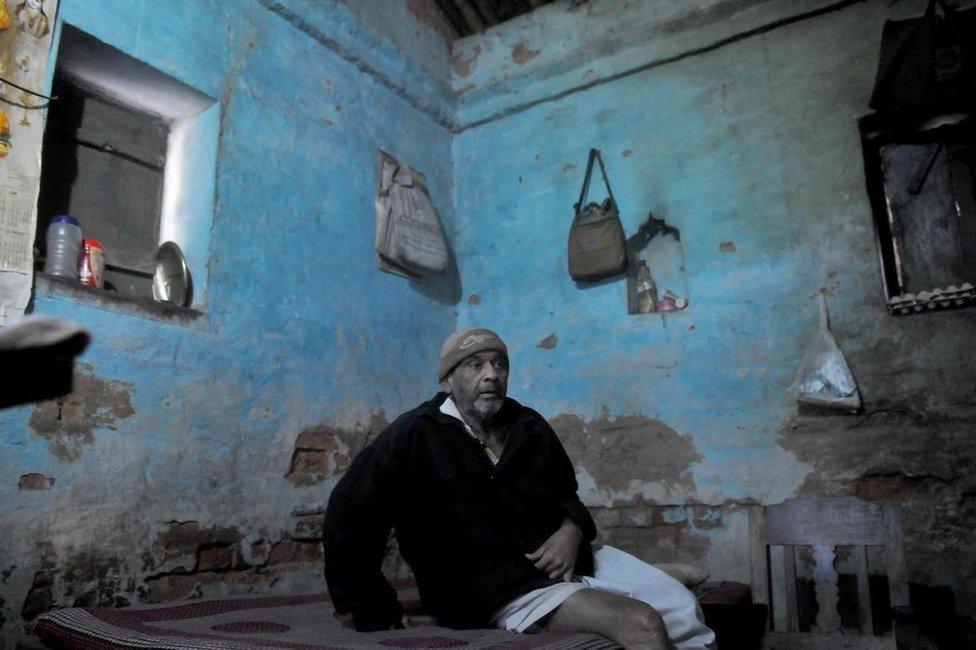
Mr Kumar's father is a small farmer who now is paralysed after a stroke
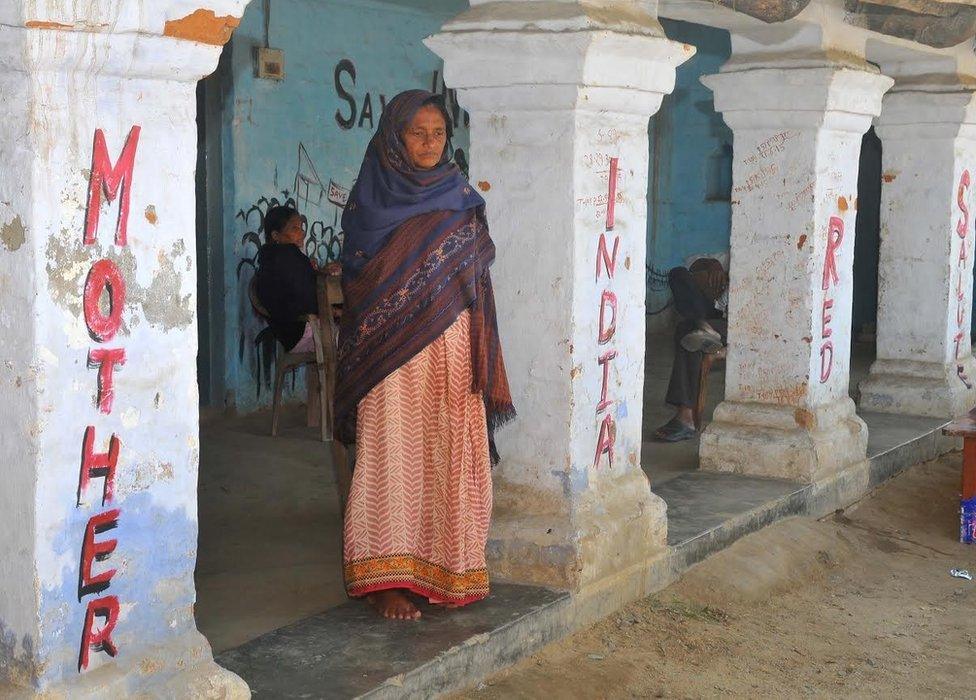
Mr Kumar's mother is a rural health worker
"Things have obviously moved fast [since my arrest]. When my Facebook account is hacked, people raise money in my name and I am targeted to run down my university, I feel a bit uneasy."
Mr Kumar says his critics - mostly irate, older urbanites - who describe him as an amateur in politics forget that he was initiated very early when he was studying at a college in Patna.
"I was part of a group in college which spoke out about why classes were not being held, why women were harassed, why sons of politicians were misbehaving on the campus."
'Lived experiences'
"So you have to understand that my politics is rooted in my lived experiences. It didn't happen overnight."
I ask him about his politics.
Some of it is a mix of liberalism and boilerplate leftism: the battle in India is "between pro-democracy versus anti-democracy, pro-people versus pro-corporate". Other times, it is more nuanced: India's left parties need "to get rid of their purity", secular parties should unite against the scourge of religious politics, the "progressive forces" have regrettably ceded space to the right-wing, parties should leave their student wings alone to help them grow freely.
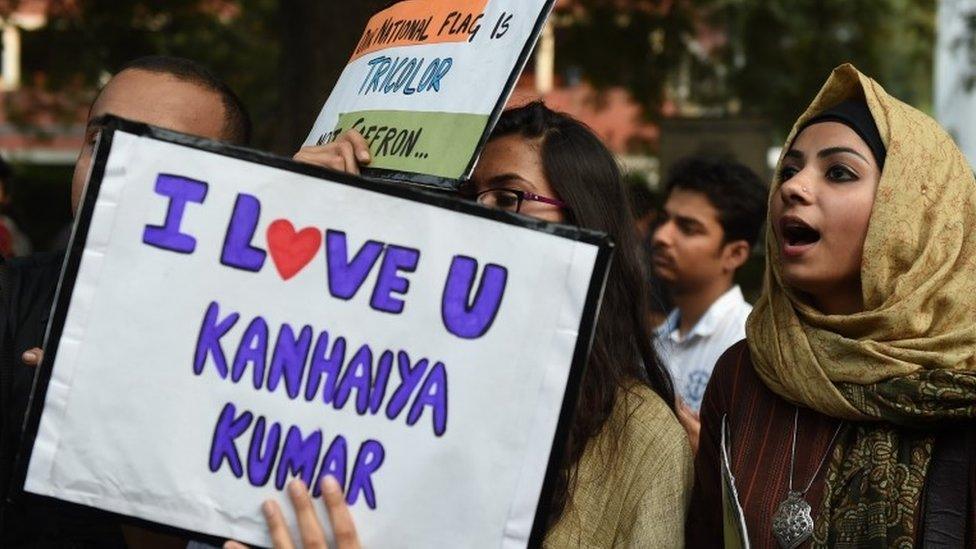
There were widespread protests against Mr Kumar's arrest
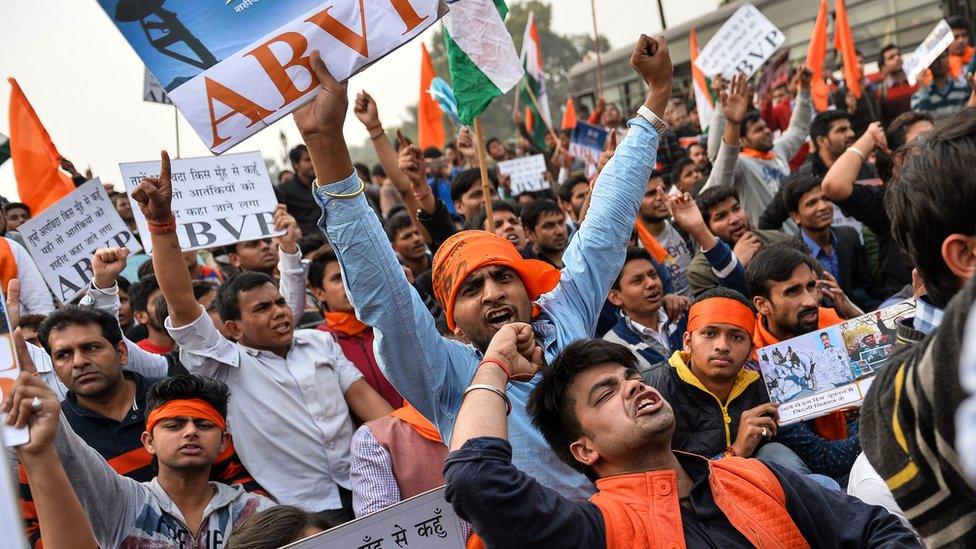
Right-wing student groups have supported the arrest of JNU students
Despite the events of the last month, Mr Kumar looks unusually calm. He is not easy to provoke. It is difficult to figure out whether he's being cheeky or earnest when he names Anupam Kher and Paresh Rawal, two Bollywood actors, who openly back Mr Modi's BJP aggressively, as his favourites.
So there is also a life beyond politics. Days before he was put behind bars for shouting slogans - reports say some of the videos of his speech telecast by some channels were doctored - he discovered Leonardo DiCaprio.
"I am brushing up my English, so we went to watch The Revenant. I loved it, mainly because of Leo. My friends were telling me that he should have won the Oscar much earlier. I had no idea about his previous work.
"When I was in jail I heard that he had won the Oscar. I felt very happy."
- Published4 March 2016
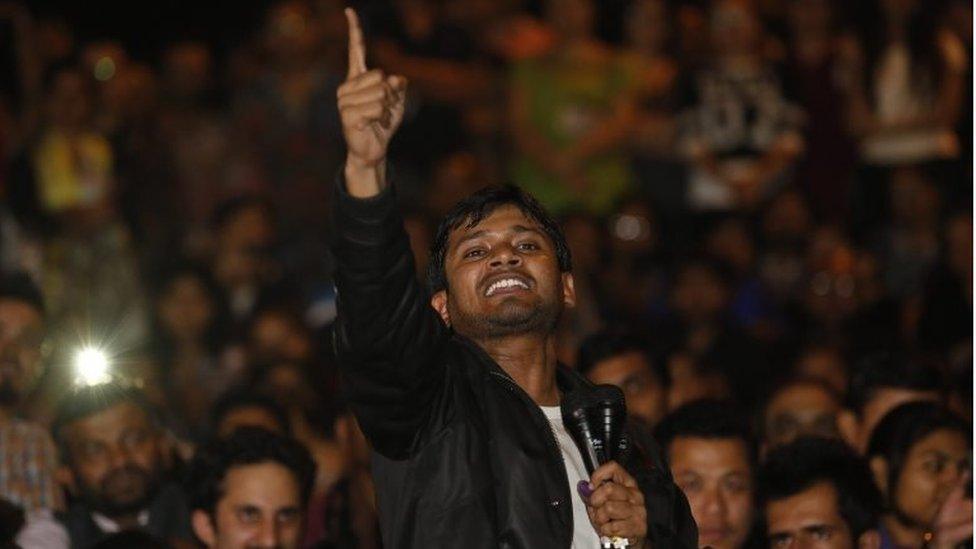
- Published16 February 2016
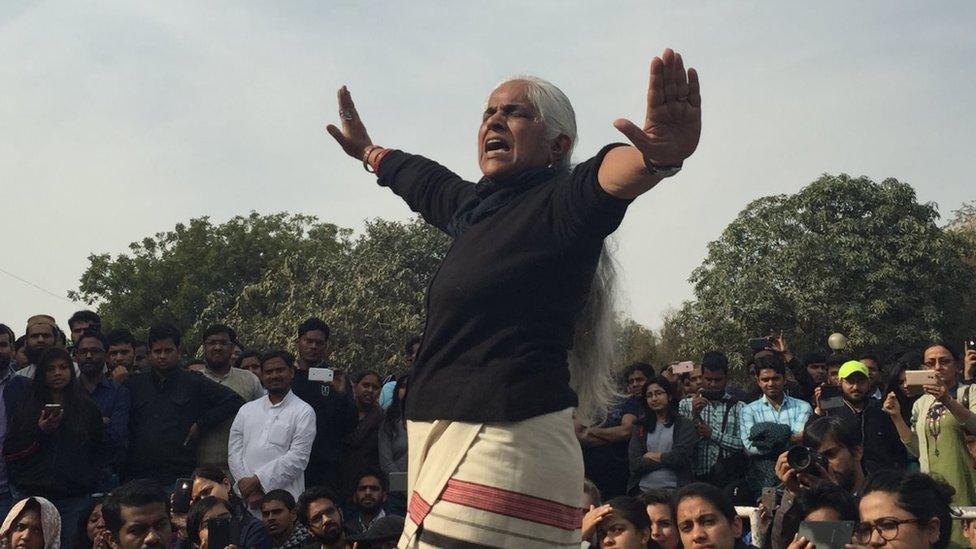
- Published15 February 2016
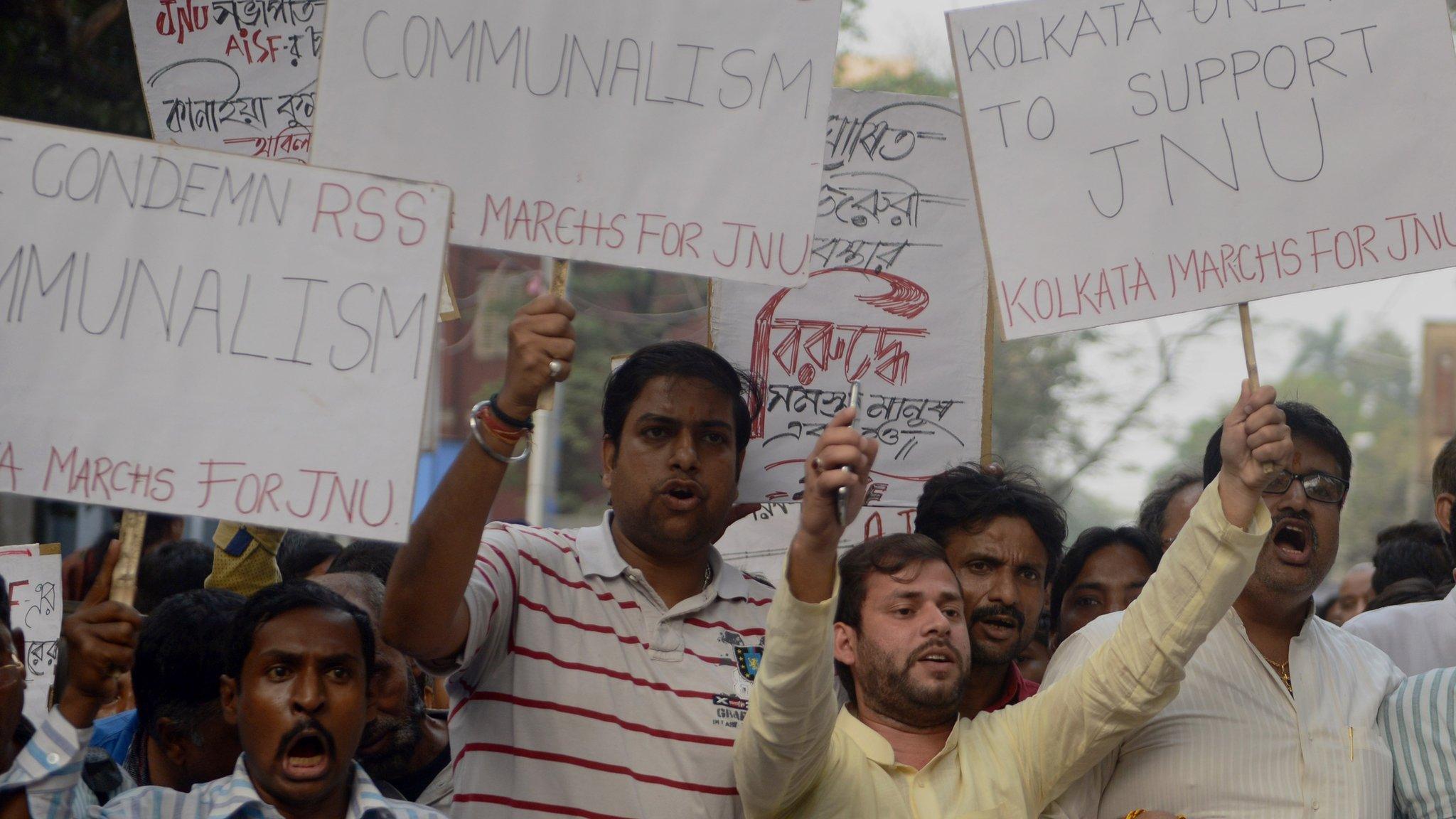
- Published24 February 2016
